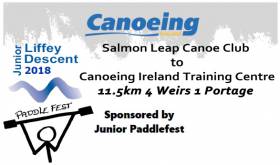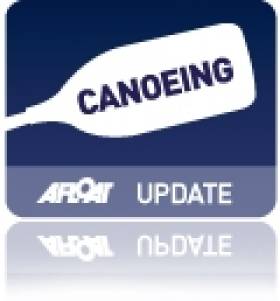Displaying items by tag: Junior Liffey Descent
#Canoeing: Senan Forrestal of Thomastown Paddlers proved the class of the field at the Junior Liffey Descent on Saturday.
Forrestal, winner of the junior race at the 59th Liffey Descent last September, negotiated the ten kilometre course from Leixlip to Strawberry Beds in a time of 51 minutes 30 seconds. The course included a portage around the dam at Leixlip reservoir just ten minutes after the start and then the massive weirs at Lucan and Wren’s Nest before the finish at the Canoe Ireland Training Centre.
Over a minute later for second place was pre-race favourite Matthew McCartney from Celbridge Paddlers in 52.54 McCartney had finished second behind European junior marathon champion Ronan Foley last year. A close third was Eoin O’Toole of Salmon Leap Canoe Club in 53.27. Winning the U15 boys class in 56.42 was Paul Donnellan with his Salmon Leap clubmate Ruairi Bray less than a minute behind.
Fastest girl was Eabha Ó Drisceoil of Salmon Leap CC, winner of the U15 age group for a second year. Despite a wobble at Lucan Weir, Ó Drisceoil recovered quickly and went on to clock a time of 60.41.
Not too far behind was Áine White of Celbridge Paddlers who was first of the U18 age group in a solid time of 1:03:30. Second was Roisin Hannon of Moy CC in Ballina who had moved up from the U15 class and finished in 1:08.06.
Paddlers had travelled from all over Ireland for the race and winning the open white water class in 1:02.32 was Simon Kenny of the Phoenix club in Cork.
In the B class races, Gael Castillo of Salmon Leap clocked a respectable time of 1:04.38 to finish best in the U18 age group. Sean King of Celbridge Paddlers won a closely contested U15 boys race in 1:09.34, with Salmon Leap’s Christian O’Sullivan just twenty seconds behind him.
By some way the biggest entry of the day came in the Under 15 C class race, with 64 entered and 59 finishing. The high entry is testament to a determined recruitment drive by clubs such as Salmon Leap, who put on regular sessions for novice paddlers in the younger age groups.
Leading home the 55 finishers was Salmon Leap’s Conor Flanagan. His time of 1:10.13 put him almost five minutes ahead of the chasers led by Ciaran Ball of the 5th Port Dollymount Sea Scouts, longtime supporters of the race. In this class, finishing was an achievement and all were safely across the finish line in just over two hours. Fastest of the nine girls competing was Katie Woods from GOYA in 1:43.47, with her club mate Roisin Bette less than a minute behind for second. GOYA (Get off Your Ass) had brought a team of 13 – nine boys and four girls – to the race from their heartland in south Co Galway and north Co Clare.
A further 23 had signed up for the U18 boys race, with Daniel Stratford, from Virginia Kayak in Co Cavan, leading them home in 1:07.22. Joanne Ball of the 5th Port Dollymount Sea Scouts was first girl in 1:17.01, with 13 entered in this class – the largest girls’ class of the day. Emma Doyle from Go Paddle was second with Virginia Alexander of Virginia third.
A total of five boats had entered the canoe doubles, and first home in 1:26.59 were Kevin O’Connor and Kevin McGrath of Kilkenny Aqua. Ethan Dowling and Emma Fay, from the Ribbontail Canoe Club in Enfield, Co Meath, were first in the mixed class with a time of 1:30.36
Results Junior Liffey Descent, Saturday, May 19th
K1 Class A -
Boys:
U18 - 1 Senan Forristal (Thomastown Paddlers) 51 mins 30 secs; 2 Matthew McCartney (Celbridge Paddlers) 52.54, 3 Eoin O’Toole (Salmon Leap CC) 53.27.
U15 - 1 Paul Donnellan (Salmon Leap CC) 56.42; 2 Ruairi Bray (Salmon Leap CC) 57.19; 3 Adam Pender (Kilkenny Aqua) 1:13.35.
U23 – James McCartney (Celbridge Paddlers) 1:00.32.
WW Open Kayaks – 1 Simon Kenny (Phoenix CC) 1:02.17; 2 Ben Higgins (Salmon Leap CC) 66.43; 3 Aoibhin Ni Bhroin (Galway KC) 68.31.
Girls:
U18 – 1 Aine White (Celbridge Paddlers) 63.30; 2 Roisin Hannon (Moy CC) 68.06.
U15 – Eabha Ni Drisceoil (Salmon Leap CC) 60.25.
K1 Class B -
Boys:
U15 - 1 Sean King (Celbridge Paddlers) 1:09.34; 2 Christian O’Sullivan (Salmon Leap CC) 1:09.54; 3 Jason O’Sullivan (Salmon Leap CC) 1:11.51.
U18: Gael Castillo (Salmon Leap CC) 63.53; 2 Michael O’Herlihy (Wildwater KC) 70.03; 3 Dan Lavelle (Salmon Leap CC) 71.08.
K1 Class C -
Boys -
U15 – 1 Conor Flanagan (Salmon Leap CC) 1:10.13; 2 Ciaran Ball (5th Port Dollymount SS) 1:15.03; 3 Finn Grennan (Sligo Grammar) 1:17.03.
U18 – 1 Daniel Stratford (Virginia KC) 1:07.22; 2 Barry Stratford (Virginia KC) 1:09.08; 3 Luke Hodkinson (5th Port Dollymount SS) 1:12.25.
U23 - 1 David Doyle (Go Paddle) 1:14.08; 2 Alex Russell (Canoeing Ireland) 1:14.48; 3 Cian Brannigan (Canoeing Ireland) 1:19.53.
Girls -
U15 – 1 Katie Woods (Goya Gang) 1:43.47; 2 Roisin Bennett (Goya Gang) 1:44.27; 3 Ruth McGrath (Kilkenny Aqua) 1:46.01.
U18 – 1 Joanne Ball (5th Port Dollymount SS) 1:17.01; 2 Emma Doyle (Go Paddle) 1:17.52; 3 Rachel Alexander (Virginia Kayak) 1:22.27.
C2 Canoe Doubles
Boys - Kevin O’Connor/Kevin McGrath (KilkennyAqua) 1:29.59. Girls - Phoebe Henderson/Sophie Henderson (Kilkenny Aqua) 1:50.07. Mixed – Emma Fay/Ethan Dowling (Ribbontail Paddlers) 1:30.36, 2 Shaun Healy/ Conor Fanning (Barrowline CC) 1:33.25; 3 Aoife Hamilton/Tom Morley (Ribbontail Paddlers) 1:46.10.
Young Kayakers Set For Tomorrow’s Junior Liffey Descent
#Kayaking - The Irish Times has a preview of Ireland’s largest junior kayaking race — and one of the biggest events in some time for Canoeing Ireland — which takes place on the River Liffey tomorrow (Saturday 19 May).
The Junior Liffey Descent is set to bring more than 160 young paddlers to Leixlip for racing to Strawberry Beds across 19 categories in four boat classes tomorrow afternoon.
Entries Open for Junior Liffey Descent
Entries are now open for young canoeists to take part on the 2011 Junior Liffey Descent.
The race kicks off at 1pm on Saturday 28 May on the River Liffey running from Salmon Leap Canoe Club in Leixlip to the Canoeing Ireland Traing Centre at Strawberry Beds.
The entry form for this year's Junior Liffey Descent is available to download HERE.































































